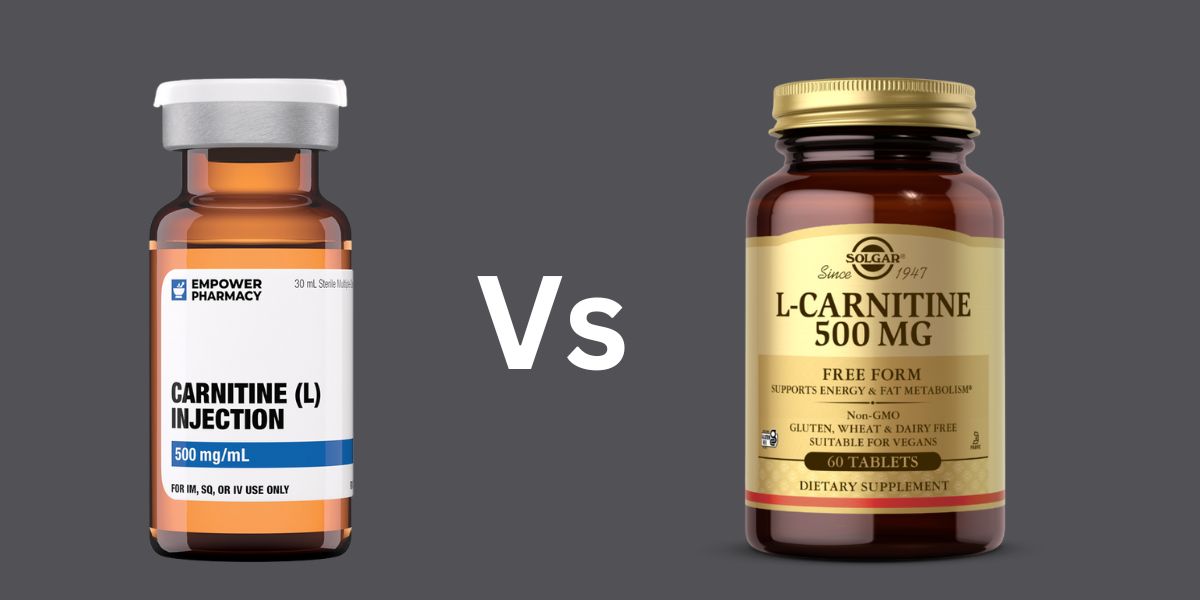The main difference between injectable and oral L-Carnitine is the body’s ability to absorb the amino acid. Injectable L Carnitine has a bioavailability roughly 4x higher than oral supplementation. This is due to the fact that injectable L Carnitine does not have to be absorbed through the gut and is delivered directly to the bloodstream.
To learn more about the details of the efficacy of each route of administration, keep reading!

Increased Bioavailability
Oral administration of L-carnitine typically shows lower bioavailability. This is because, when taken orally, L-carnitine must pass through the digestive system where it is subject to breakdown and alteration before it can be absorbed into the bloodstream. Factors like the presence of food in the stomach, gastrointestinal health, and the efficiency of the individual’s digestive system can affect how much L-carnitine is actually absorbed. Generally, only a portion of the orally ingested L-carnitine reaches systemic circulation.
In contrast, injectable administration of L-carnitine bypasses the digestive system entirely, leading to significantly higher bioavailability. When L-carnitine is injected, it is directly introduced into the bloodstream or muscle tissue, allowing for almost complete absorption into the systemic circulation. This method ensures that a more controlled and higher concentration of L-carnitine is made available to the body’s tissues.
Improved Efficacy
Due to higher bioavailability and increased rates of absorption, there is a solid argument supporting the use of injectable L-carnitine over oral supplementation.
Improved Lipid Metabolism
Studies have shown that switching from oral to intravenous L-carnitine can improve lipid profiles in patients, such as reducing serum free fatty acids and increasing high-density lipoprotein-cholesterol levels. This suggests that injectable L-carnitine may be more effective in managing cardiovascular health risks associated with poor lipid metabolism.
Enhanced Athletic Performance and Muscle Recovery
Injectable L-carnitine is popular among athletes for its potential to enhance performance and aid in muscle recovery. By increasing the transportation of fatty acids into the mitochondria for energy production, it can potentially improve endurance and reduce the buildup of lactic acid, which is often associated with muscle fatigue.
Targeted Treatment for Specific Health Conditions
Injectable L-carnitine can be particularly beneficial in certain health conditions where oral supplementation may not be as effective. For instance, patients with certain metabolic disorders or those on hemodialysis may benefit more from injectable L-carnitine due to its direct and efficient absorption.
Controlled Dosage and Administration
With injections, healthcare professionals can control the exact dose of L-carnitine being administered, ensuring optimal levels are achieved for therapeutic effects. This level of control is harder to achieve with oral supplements, where absorption can be influenced by factors like food intake and gastrointestinal health.
Reduced Gastrointestinal Disturbances
Oral L-carnitine can sometimes cause gastrointestinal side effects like nausea or indigestion. Injectable L-carnitine bypasses the gastrointestinal tract, thus potentially reducing these side effects and improving overall patient tolerance and comfort
Injectable L-carnitine is More Cost-effective
Injectable L-carnitine is more cost-effective than oral L-carnitine for two main reasons. Firstly, the higher bioavailability of injectable L-carnitine means that a smaller dose is often required to achieve the same physiological effect as a larger oral dose. This is because injectable L-carnitine bypasses the digestive system and is absorbed directly into the bloodstream, leading to higher efficiency and less wastage of the supplement.
Secondly, the potential for quicker and more pronounced effects with injectable L-carnitine might reduce the overall time required to achieve desired health or fitness goals. For instance, athletes or individuals focused on body composition may see faster improvements in muscle recovery and performance. This efficiency can translate into fewer doses needed over time, thus lowering long-term costs.
Takeaway
Injectable L-carnitine is generally considered more effective than oral supplementation due to its higher bioavailability and more direct absorption into the bloodstream. This efficiency means potentially faster and more pronounced effects, which can be particularly beneficial for body composition and overall health. Moreover, the reduced need for larger doses and the potential to achieve health goals more quickly can make injectable L-carnitine a more cost-effective option in the long run.
However, it’s crucial to consult with healthcare professionals to determine the most suitable form of supplementation for your specific needs. If you’re considering injectable L-carnitine as part of your health regimen, especially for weight management or fitness goals, reach out to us today to learn more about how L-Carnitine can be part of your plan!
